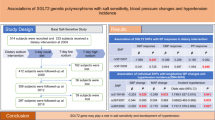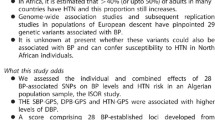Abstract
Background
Blood pressure is influenced by hereditary factors and dietary habits. The objective of this study was to examine the effect of dietary salt consumption and single-nucleotide polymorphisms (SNPs) on blood pressure (BP).
Methods
This was a cross-sectional analysis of 2728 male participants who participated in a health examination in 2009. Average dietary salt consumption was estimated using electronically collected meal purchase data from cafeteria. A multivariate analysis, adjusting for clinically relevant factors, was conducted to examine whether the effect on BP of salt consumption, SNPs, and interaction between salt consumption and each SNP. This study examined the SNPs AGT rs699 (Met235Thr), ADD1 rs4961 (Gly460Trp), NPPA rs5063 (Val32Met), GPX1 rs1050450 (Pro198Leu), and AGTR1 rs5186 (A1166C) in relation to hypertension and salt sensitivity.
Results
BP was not significantly associated with SNPs or salt consumption. The interaction between salt consumption and SNPs with systolic BP showed a significant association in NPPA rs5063 (Val32Met) (P = 0.023) and a marginal trend toward significance in rs4961 and rs1050450 (P = 0.060 and 0.067, respectively).
Conclusion
The effect of salt consumption on BP differed by genotype. Dietary salt consumption and genetic variation can predict a high risk of hypertension.

Similar content being viewed by others
References
Shimamoto K, Ando K, Fujita T, et al. The Japanese society of hypertension guidelines for the management of hypertension (JSH 2014). Hypertens Res. 2014;37(4):253–390. doi:10.1038/hr.2014.20.
World Health Organization. WHO guideline: sodium intake for adults and children. Geneva: WHO Press; 2012.
The National Health and Nutrition Survey in Japan, 2012 (homepage on the Internet). http://www.mhlw.go.jp/bunya/kenkou/eiyou/dl/h24-houkoku.pdf. Accessed 30 Nov 2014.
Mente A, O’Donnell MJ, Rangarajan S, et al. Association of urinary sodium and potassium excretion with blood pressure. N Engl J Med. 2014;371(7):601–11. doi:10.1056/NEJMoa1311989.
The National Health and Nutrition Survey in Japan, 2006 (homepage on the Internet). http://www.mhlw.go.jp/houdou/2008/04/dl/h0430-2a.pdf. doi:10.1291/hypres.30.887.
Beeks E, Kessels AG, Kroon AA, et al. Genetic predisposition to salt-sensitivity: a systematic review. J Hypertens. 2004;22(7):1243–9.
Sanada H, Jones JE, Jose PA. Genetics of salt-sensitive hypertension. Curr Hypertens Rep. 2011;13(1):55–66. doi:10.1007/s11906-010-0167-6.
Kelly TN, He J. Genomic epidemiology of blood pressure salt sensitivity. J Hypertens. 2012;30(5):861–73. doi:10.1097/HJH.0b013e3283524949.
Ehret GB, Munroe PB, Rice KM, et al. Genetic variants in novel pathways influence blood pressure and cardiovascular disease risk. Nature. 2011;478(7367):103–9. doi:10.1038/nature10405.
Kawano Y, Tsuchihashi T, Matsuura H, et al. Report of the working group for dietary salt reduction of the Japanese society of hypertension: (2) assessment of salt intake in the management of hypertension. Hypertens Res. 2007;30(10):887–93. doi:10.1291/hypres.30.887.
Kawasaki T, Itoh K, Uezono K, et al. A simple method for estimating 24 h urinary sodium and potassium excretion from second morning voiding urine specimen in adults. Clin Exp Pharmacol Physiol. 1993;20(1):7–14.
Tanaka T, Okamura T, Miura K, et al. A simple method to estimate populational 24-h urinary sodium and potassium excretion using a casual urine specimen. J Hum Hypertens. 2002;16(2):97–103. doi:10.1038/sj.jhh.1001307.
Nakatochi M, Ushida Y, Yasuda Y, et al. Identification of an interaction between VWF rs7965413 and platelet count as a novel risk marker for metabolic syndrome: an extensive search of candidate polymorphisms in a case-control study. PLoS ONE. 2015;10(2):e0117591. doi:10.1371/journal.pone.0117591.
Nishida N, Tanabe T, Takasu M, et al. Further development of multiplex single nucleotide polymorphism typing method, the DigiTag2 assay. Anal Biochem. 2007;364(1):78–85. doi:10.1016/j.ab.2007.02.005.
R Core Team. R: a language and environment for statistical computing (homepage on the Internet). Vienna: R Foundation for Statistical Computing. http://www.R-project.org/. Accessed 8 Dec 2014.
Manolio TA, Collins FS, Cox NJ, et al. Finding the missing heritability of complex diseases. Nature. 2009;461(7265):747–53. doi:10.1038/nature08494.
Levin ER, Gardner DG, Samson WK. Natriuretic peptides. N Engl J Med. 1998;339(5):321–8. doi:10.1056/NEJM199807303390507.
Conen D, Glynn RJ, Buring JE, et al. Natriuretic peptide precursor a gene polymorphisms and risk of blood pressure progression and incident hypertension. Hypertension. 2007;50(6):1114–9. doi:10.1161/HYPERTENSIONAHA.107.097634.
Zhang S, Mao G, Zhang Y, et al. Association between human atrial natriuretic peptide Val7Met polymorphism and baseline blood pressure, plasma trough irbesartan concentrations, and the antihypertensive efficacy of irbesartan in rural Chinese patients with essential hypertension. Clin Ther. 2005;27(11):1774–84. doi:10.1016/j.clinthera.2005.11.008.
Katsuya T, Ishikawa K, Sugimoto K, et al. Salt sensitivity of Japanese from the viewpoint of gene polymorphism. Hypertens Res. 2003;26(7):521–5.
Sugimoto K, Hozawa A, Katsuya T, et al. Alpha-Adducin Gly460Trp polymorphism is associated with low renin hypertension in younger subjects in the Ohasama study. J Hypertens. 2002;20(9):1779–84.
Wang R, Zhong B, Liu Y, et al. Association between alpha-adducin gene polymorphism (Gly460Trp) and genetic predisposition to salt sensitivity: a meta-analysis. J Appl Genet. 2010;51(1):87–94.
Liu K, Liu Y, Liu J, et al. α-adducin Gly460Trp polymorphism and essential hypertension risk in Chinese: a meta-analysis. Hypertens Res. 2011;34(3):389–99. doi:10.1038/hr.2010.252.
Yamada Y, Ando F, Shimokata H. Association of gene polymorphisms with blood pressure and the prevalence of hypertension in community-dwelling Japanese individuals. Int J Mol Med. 2007;19(4):675–83.
Takeuchi F, Yamamoto K, Katsuya T, et al. Reevaluation of the association of seven candidate genes with blood pressure and hypertension: a replication study and meta-analysis with a larger sample size. Hypertens Res. 2012;35(8):825–31. doi:10.1038/hr.2012.43.
Wang WY, Zee RY, Morris BJ. Association of angiotensin II type 1 receptor gene polymorphism with essential hypertension. Clin Genet. 1997;51(1):31–4.
Kainulainen K, Perola M, Terwilliger J, et al. Evidence for involvement of the type 1 angiotensin II receptor locus in essential hypertension. Hypertension. 1999;33(3):844–9.
Bonnardeaux A, Davies E, Jeunemaitre X, et al. Angiotensin II type 1 receptor gene polymorphisms in human essential hypertension. Hypertension. 1994;24(1):63–9.
Jiang Z, Zhao W, Yu F, et al. Association of angiotensin II type 1 receptor gene polymorphism with essential hypertension. Chin Med J (Engl). 2001;114(12):1249–51.
Ono K, Mannami T, Baba S, et al. Lack of association between angiotensin II type 1 receptor gene polymorphism and hypertension in Japanese. Hypertens Res. 2003;26(2):131–4.
Takachi R, Ishihara J, Iwasaki M, et al. Validity of a self-administered food frequency questionnaire for middle-aged urban cancer screenees: comparison with 4-day weighed dietary records. J Epidemiol. 2011;21(6):447–8.
De Keyzer W, Dofková M, Lillegaard IT, et al. Reporting accuracy of population dietary sodium intake using duplicate 24 h dietary recalls and a salt questionnaire. Br J Nutr. 2015;113(3):488–97. doi:10.1017/S0007114514003791.
Acknowledgments
Toyota Motor Co., Ltd., provided the annual health examination data as well as financial support for this study for the purpose of developing medicine and promoting the health of their employees. The authors also acknowledge Editage for providing editorial and publication supports, Ms. Yoko Kubo for data managing, and Ms. Michiyo Hiraoka for SNP typing.
Author information
Authors and Affiliations
Corresponding author
Ethics declarations
Conflict of interest
Support for this work was provided by the Center of Innovation STREAM Program at the Nagoya University Institute of Innovation for Future Society, the government-led Comprehensive Special Zones for Local Revitalization project, and the Toyota Motor Co., Ltd., for the financial support. The Department of Nephrology, Nagoya University Graduate School of Medicine received research promotion grants from Astellas, Alexion, Otsuka, Kyowa Hakko Kirin, Daiichi Sankyo, Dainippon Sumitomo, Takeda, Torii, Pfizer, and Mochida. The Center for Advanced Medicine and Clinical Research, Nagoya University Hospital received a donation from Eisai Co., Ltd. Department of CKD Initiatives, Nagoya University Graduate School of Medicine received donation from MSD, Dainippon Sumitomo, Kyow Hakko Kirin, Kowa, Chugai, Boehringer Ingelheim, Nihon Medi-Physics Co., Ltd., and research promotion grants from Daiichi Sankyo, Takeda, Torii, Astellas, and Shionogi.
Ethical approval
All procedures performed in studies involving human participants were in accordance with the ethical standards of the institutional research committee at which the studies were conducted (IRB approval number 1089-4) and with the 1964 Helsinki declaration and its later amendments or comparable ethical standards.
Informed consent
Informed consent was obtained from all individual participants included in the study.
About this article
Cite this article
Imaizumi, T., Ando, M., Nakatochi, M. et al. Association of interactions between dietary salt consumption and hypertension-susceptibility genetic polymorphisms with blood pressure among Japanese male workers. Clin Exp Nephrol 21, 457–464 (2017). https://doi.org/10.1007/s10157-016-1315-3
Received:
Accepted:
Published:
Issue Date:
DOI: https://doi.org/10.1007/s10157-016-1315-3




